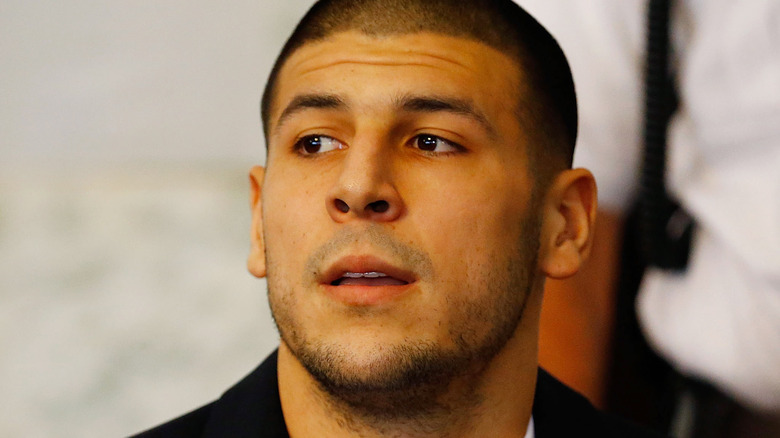Disturbing Details Found In Aaron Hernandez's Prison Death Investigation
In 2017, American NFL football player turned convicted murderer, Aaron Hernandez, committed suicide in his jail cell, two years after he was sentenced to life in prison for killing his friend, Odin Lloyd. Lloyd had been dating the sister of Hernandez's fiancée. On top of that murder conviction, Hernandez was found guilty on several charges related to firearms, according to Sporting News. In 2014, he was also indicted for the 2012 double-murder of Furtado and Daiel Abreu in Boston, as Sporting News also notes. (For those crimes, Hernandez was acquitted. He was also indicted in a non-fatal shooting in 2015.)
Hernandez, who was just 27 years old when he died, had already experienced fame, fatherhood, love, and several entanglements with the law, beginning when he played tight end for the University of Florida college football team, according to Biography. He was also the youngest player ever in the NFL when he was drafted by the New England Patriots in 2010 at the age of 21, according to Pro Football Reference. Hernandez made one Super Bowl appearance with the Patriots in 2012, but New England would come up short in the game against the New York Giants.
If you or anyone you know is having suicidal thoughts, please call the National Suicide Prevention Lifeline at 1-800-273-TALK (8255).
The night that the convicted tight end died was just like any other
Hernandez was serving a life sentence without the possibility of parole at Souza-Baranowski Correctional Center in Shirley, Massachusetts when he died. According to the death investigation report issued by the Massachusetts Department of State Police and published by Autopsy Files, nothing seemed amiss on the evening of April 19, 2017. Hernandez got off the phone around 10 p.m. and went into cell number 57 in the general housing unit. Hernandez would not come back out alive. According to Bristol County Sheriff Thomas Hodgson, Hernandez was charming and witty while incarcerated, but he also fought with other inmates on several occasions, according to ABC News.
For this reason, Hernandez was transferred to a single-inmate cell at the facility. According to the death investigation report published by Autopsy Files, a corrections officer, who started his shift at 11 p.m. that night, last saw Hernandez at 1 a.m. when he did his standard round of welfare checks. Later on at 3:03 a.m., he noticed a sheet hanging in front of Hernandez's cell door. When Hernandez didn't respond to his command to take the sheet down or "sound off," the officer poked at the sheet, and it fell. That's when he saw Hernandez, naked, hanging from a sheet tied to the window bars in the cell. He had "John 3:16" — a reference to the Bible verse— scrawled on his forehead.
John 3:16 was also written on the wall of his jail cell
After Hernandez's body was discovered, an alert was sounded, and other officers came to help. Hernandez was taken down from the sheet with which he had hanged himself, but he would never again regain consciousness, and was pronounced dead at a local hospital a short time later. Per the death investigation report, Hernandez had crammed cardboard onto the tracks of the cell door so that it could only be opened manually, and when the corrections officers entered the cell to get him down, there was a large amount of shampoo on the floor, which caused it to be slippery (via Autopsy Files).
Other details reported in Hernandez's autopsy included a fresh cut on his middle finger and a circle of dried blood on each foot. In Hernandez's cell, there were drawings on the cell walls, and "John 3:16" was also written on the wall in "a substance consistent with blood," according to the death investigation report. A Bible in the cell was also found open to John 3:16. The 16th verse was "marked in blood," the report noted. John 3:16 may have had a double meaning for Hernandez. The verse says, "For God so loved the world that he gave his one and only Son, that whoever believes in him shall not perish but have eternal life." "John 3:16" is also popular at sporting events, though, where people hold signs inscribed with "John 3:16," according to The Boston Globe.
There were also three handwritten letters
Other meaningful things found in Hernandez's cell were three handwritten notes next to the open Bible. Who those letters were for was redacted from the death investigation report, though. According to Rolling Stone, Hernandez's attorney, Jose Baez, later wrote in his book "Unnecessary Roughness: Inside the Trial and Final Days of Aaron Hernandez" that those letters were written for himself, Hernandez's fiancée, and their young daughter. The letter to Baez was apparently written following his acquittal on double-murder charges.
In the letter to his fiancée, though, Hernandez called her an angel and the very definition of God's love. "Tell my story fully but never think anything besides how much I love you. This was the supreme almightys [sic] plan, not mine!" Hernandez wrote. (Hernandez's fiancée disputed that his death was by suicide, as Rolling Stone also notes.) To his daughter, Hernandez wrote, "Daddy will never leave you! I'm entering a timeless realm in which I can enter into any form at any time because everything that could happen or not happened I see all at once! Life is eternal — believe!! Love, repent, and see me/yourself in everyone."
Hernandez had severe CTE
Once the Hernandez autopsy was complete it was revealed he had stage 3 chronic traumatic encephalopathy, or CTE, according to NBC News. The condition is a progressive, degenerative brain disease caused by "repetitive brain trauma," as Boston University reports. It is often found in athletes who play high-impact sports, but per BU, Hernandez was the worst case of CTE ever seen in somebody so young. The disease, which has four stages, can cause dementia, aggression, and mood changes.
At the time of Hernandez's autopsy, the director of CTE research at Boston University, Dr. Ann McKee, told the Boston Globe, "We can't take the pathology and explain the behavior, but we can say collectively that individuals with CTE of this severity have difficulty with impulse control, decision-making, aggression," and these subjects are often emotionally volatile and prone to rage behavior, McKee added. In his autopsy, Hernandez was also found to have a genetic marker linked to neurodegenerative diseases, which is another possible contributing factor to the severity of his condition, according to NPR.
Hernandez died before the appeals process was complete
After Hernandez died by what was ruled to be suicide, a state judge vacated his conviction in the Lloyd case, per Massachusetts state law. At that time, state law mandated that if a convicted felon died before the appeal process is complete, then the relevant conviction is erased and the case is returned to its pretrial status, according to Sporting News. Based on reporting from the AP, though, Hernandez's conviction was later reinstated by the Massachusetts Supreme Court. The practice of vacating convictions if a felon dies before the appeals process is complete was then abolished in the state of Massachusetts.
Lloyd's mother, who settled a lawsuit with the Hernandez estate shortly before the Hernandez conviction was posthumously reinstated, was pleased with the outcome, according to the AP. "This decision has helped the family to obtain closure from the horrible loss of their beloved son Odin," Lloyd family attorney Doug Sheff said in a statement. "He was an inspiration to all who knew him and a devoted member of his family and the community. It has solidified their faith in the Massachusetts Justice System," Sheff said.





